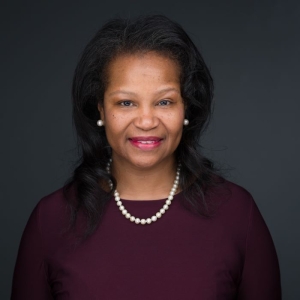Professor named to the Fellows of the American Association of Nurse Practitioners for 2024
June 20, 2024 / by Michele Carroll- Practice
Tracie Kirkland, associate teaching professor in the Master of Science in Nursing (MSN) program at the USC Suzanne Dworak-Peck School of Social Work has been selected for induction into the Fellows of the American Association of Nurse Practitioners (FAANP). Kirkland receives this prestigious honor on June 27 at the 2024 AANP National Conference in Nashville, Tennessee.
The FAANP program recognizes the outstanding achievements and exemplary service of nurse practitioner (NP) leaders who have made outstanding contributions to education, policy, clinical practice and research. Established in 2000, the FAANP program has recognized just 942 nurse practitioners among the more than 385,000 licensed NPs in the U.S. who have made a positive and profound impact on national and global health.
“I am incredibly honored and humbled to receive this distinction,” Kirkland said. “Since being nominated, it has been an opportunity to develop, assess and look back narratively over my years of work in academia, scholarship and clinical practice to find the intersectionality of my service, my teaching and my scholarship.”
Dedicated to community service
Kirkland’s career path as a nurse educator has been dedicated to community service as an adult health nurse practitioner, pediatric nurse practitioner and research coordinator, with experience in large academic teaching facilities as well as private practice. Her clinical interest is in social determinants of health (SDOH), the nonbiological factors found to be responsible for up to 80% of health outcomes.
“My passion for teaching and scholarship has really intersected with social determinants of health and their impact on health outcomes with medically underserved communities,” Kirkland said. “Nurse practitioners are an important element in identifying and addressing social determinants of health because we know that where individuals live, work, play and worship impacts health outcomes.”
Nurse practitioners are historically the most trusted profession and are frequently the frontline of patient care, particularly among lower socioeconomic and other marginalized populations, making them an essential component of recognizing the impact of SDOH among their patients and providing preventative education and interventions. The MSN is the first nursing program within a school of social work, providing an advanced degree nursing education that includes a focus on understanding social factors to enhance patient care. Emphasis is also placed on collaboration with other professions and effecting positive social change.
“We work across the continuum of life from womb to tomb,” Kirkland said. “We screen and we ask questions about where people live, their access to health care, and what services they need. We are able to collaborate with our community resources to link individuals to service for early identification and prevention. This focus improves morbidity and decreases mortality, while reducing economic burden to society.”
Scholarship focused on needs of marginalized populations
Kirkland’s research has a special focus on Black women and food insecurity, which demonstrates the clear link between SDOH and the impact that nurse practitioners can have on marginalized populations, as often these professionals are their only access to health care.
“Black women are notoriously the head of household, and because of that we see an increase in food insecurity in Black women,” Kirkland said. “As nurse practitioners, we can screen for food insecurity and link individuals to resources. We have a real potential to decrease risk factors such as diabetes, obesity, different types of cancer and mental health.”
Kirkland has served as co-principal investigator on several research studies examining diabetes and hydration, and publications in both clinical and educational research. In 2023, she completed her PhD in nursing education, with a dissertation on Social Support and Loneliness in Black Women Experiencing COVID-19 Food Insecurity. As a member of the National Organization of Nurse Practitioner Faculties, whose membership represents approximately 96% of all nurse practitioner programs in the U.S., she spearheaded the creation of a pioneering special interest workgroup to address the need to integrate SDOH into nurse-practitioner curriculum, which has since become a mandate in the organization’s competency-based educational essentials.
“We are trusted by these really vulnerable populations and have an ability to influence them in ways that maybe no other profession does,” Kirkland said. “I’m honored to make a difference in educating our next generation of nurse practitioners.”
To reference the work of our faculty online, we ask that you directly quote their work where possible and attribute it to "FACULTY NAME, a professor in the USC Suzanne Dworak-Peck School of Social Work” (LINK: https://dworakpeck.usc.edu)
